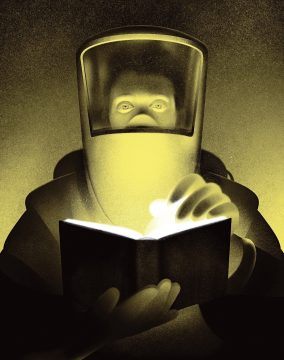Jill Lepore in The New Yorker:
 When the plague came to London in 1665, Londoners lost their wits. They consulted astrologers, quacks, the Bible. They searched their bodies for signs, tokens of the disease: lumps, blisters, black spots. They begged for prophecies; they paid for predictions; they prayed; they yowled. They closed their eyes; they covered their ears. They wept in the street. They read alarming almanacs: “Certain it is, books frighted them terribly.” The government, keen to contain the panic, attempted “to suppress the Printing of such Books as terrify’d the People,” according to Daniel Defoe, in “A Journal of the Plague Year,” a history that he wrote in tandem with an advice manual called “Due Preparations for the Plague,” in 1722, a year when people feared that the disease might leap across the English Channel again, after having journeyed from the Middle East to Marseille and points north on a merchant ship. Defoe hoped that his books would be useful “both to us and to posterity, though we should be spared from that portion of this bitter cup.” That bitter cup has come out of its cupboard.
When the plague came to London in 1665, Londoners lost their wits. They consulted astrologers, quacks, the Bible. They searched their bodies for signs, tokens of the disease: lumps, blisters, black spots. They begged for prophecies; they paid for predictions; they prayed; they yowled. They closed their eyes; they covered their ears. They wept in the street. They read alarming almanacs: “Certain it is, books frighted them terribly.” The government, keen to contain the panic, attempted “to suppress the Printing of such Books as terrify’d the People,” according to Daniel Defoe, in “A Journal of the Plague Year,” a history that he wrote in tandem with an advice manual called “Due Preparations for the Plague,” in 1722, a year when people feared that the disease might leap across the English Channel again, after having journeyed from the Middle East to Marseille and points north on a merchant ship. Defoe hoped that his books would be useful “both to us and to posterity, though we should be spared from that portion of this bitter cup.” That bitter cup has come out of its cupboard.
In 1665, the skittish fled to the country, and alike the wise, and those who tarried had reason for remorse: by the time they decided to leave, “there was hardly a Horse to be bought or hired in the whole City,” Defoe recounted, and, in the event, the gates had been shut, and all were trapped. Everyone behaved badly, though the rich behaved the worst: having failed to heed warnings to provision, they sent their poor servants out for supplies. “This Necessity of going out of our Houses to buy Provisions, was in a great Measure the Ruin of the whole City,” Defoe wrote. One in five Londoners died, notwithstanding the precautions taken by merchants. The butcher refused to hand the cook a cut of meat; she had to take it off the hook herself. And he wouldn’t touch her money; she had to drop her coins into a bucket of vinegar. Bear that in mind when you run out of Purell.
“Sorrow and sadness sat upon every Face,” Defoe wrote. The government’s stricture on the publication of terrifying books proved pointless, there being plenty of terror to be read on the streets. You could read the weekly bills of mortality, or count the bodies as they piled up in the lanes. You could read the orders published by the mayor: “If any Person shall have visited any Man known to be infected of the Plague, or entered willingly into any known infected House, being not allowed: The House wherein he inhabiteth shall be shut up.” And you could read the signs on the doors of those infected houses, guarded by watchmen, each door marked by a foot-long red cross, above which was to be printed, in letters big enough to be read at a distance, “Lord, Have Mercy Upon Us.”
More here.
